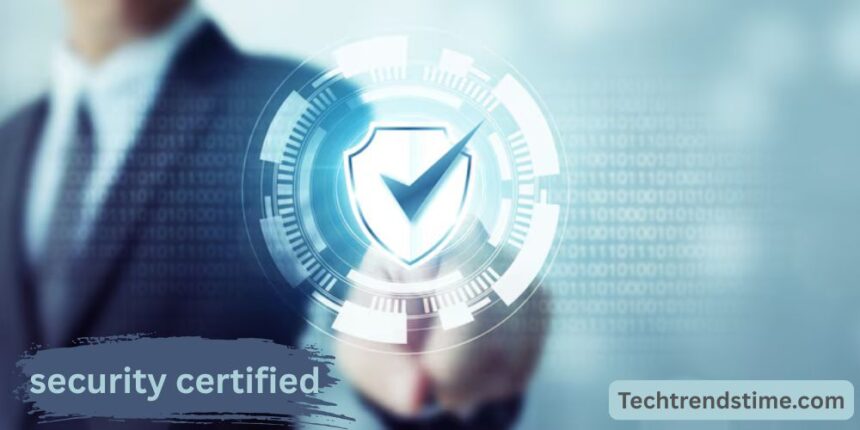In today’s digital-first world, where data breaches and cyberattacks are an everyday threat, being “security certified” is no longer a luxury — it’s a necessity. From small businesses to multinational corporations, cybersecurity has become the backbone of digital trust. With hackers becoming more sophisticated and regulations tightening globally, individuals and organizations alike are turning to certifications to prove their knowledge, skills, and commitment to security excellence.
What Does “Security Certified” Really Mean?
Being security certified means that a person or organization has passed rigorous testing and evaluation to demonstrate a solid understanding of cybersecurity principles, tools, and best practices. It’s an acknowledgment from a recognized body (like CompTIA, (ISC)², EC-Council, Cisco, etc.) that the individual or company is capable of identifying, preventing, and mitigating cybersecurity threats. In simpler terms, it’s like earning a black belt in digital self-defense.
Why Security Certifications Are Essential in 2025 and Beyond
Cybercrime is expected to cost the world $10.5 trillion annually by 2025. Attacks are more frequent, complex, and damaging than ever before. Without certified professionals, businesses leave themselves exposed to devastating losses. Despite growing demand, there’s a global shortage of cybersecurity talent. According to (ISC)², over 3.4 million cybersecurity roles are unfilled worldwide. Getting certified not only makes you more marketable, but it also fills critical gaps in an under-resourced field.
Breaking Down the Top Security Certifications
Security+ is the perfect starting point. It’s vendor-neutral, globally recognized, and focuses on the core principles of risk management, incident response, and access control. Many employers look at Security+ as a “must-have” for entry-level roles like security analyst or systems administrator. If Security+ is the beginner’s badge, CISSP is the crown jewel. It covers eight domains including security operations, software development security, and asset security. It’s meant for experienced pros and is one of the highest-paying certifications in the industry.
Organizational Certifications That Build Trust
This is a global standard for information security management systems (ISMS). Organizations that earn ISO 27001 show their customers and partners that they take data security seriously. Developed by the AICPA, SOC 2 certification is vital for service providers storing customer data in the cloud. It evaluates how well a company protects information, covering security, availability, processing integrity, confidentiality, and privacy.
How to Choose the Right Security Certification
Choosing a certification can be overwhelming. With so many options, how do you pick the one that aligns with your career? Are you aiming to be a security analyst, penetration tester, compliance officer, or chief information security officer? Different roles demand different certifications. Security+ might work for analysts, while CISSP is ideal for managers and architects. Beginner? Intermediate? Expert? Choose a cert that matches your current skill level. Jumping straight to CISSP without the prerequisite experience won’t help. Some industries prefer specific certifications. For instance, government jobs in the U.S. often require DoD 8570-approved certs like Security+ or CEH.
The Process of Becoming Security Certified
Depending on the cert, study time can range from a few weeks to several months. Utilize video courses, textbooks, flashcards, and practice tests. Online communities like Reddit’s r/cybersecurity can also provide guidance and motivation. Once you’re ready, register for your exam through the issuing body. Most exams are proctored and can be taken in-person or online. Each certification has a different passing score and exam format. Some are multiple choice, while others are scenario-based or include practical labs. Many certifications are valid for 2-3 years. To maintain them, you’ll need to complete Continuing Professional Education (CPE) credits or retake the exam.
Career Benefits of Getting Security Certified
Getting certified doesn’t just make your resume look good — it can change your entire career trajectory. Certified professionals often earn significantly more. For example, CISSP holders average over $120,000 annually. With a cert under your belt, you’re not just another candidate — you’re a certified asset. Employers are more likely to retain and promote certified staff. Certifications are recognized globally, which means you can find work not just in your country, but almost anywhere in the world.
Challenges You May Face
Cybersecurity is complex and ever-evolving. You’ll need to commit to continuous learning. Some certifications can cost $700 or more, and that’s not counting training material. But think of it as investing in your future, not just spending money. Balancing study with a full-time job or other responsibilities can be tough. Plan accordingly and create a consistent schedule.
Real-World Applications of Being Security Certified
Security certified professionals don’t just sit behind desks. They defend real systems in hospitals, banks, government, and tech firms. A certified SOC analyst recently detected and shut down a ransomware threat at a hospital before it could encrypt a single file — saving the organization millions. Certified CISOs are responsible for designing and enforcing company-wide security frameworks. Their decisions impact thousands of employees and millions of customers.
Security Certifications vs. College Degrees
There’s a growing debate — which is better? Certifications can be earned in months, while degrees take years. Also, a cert might cost $500 to $1000 — way less than a degree. Certs are more targeted and hands-on. They teach real-world skills that employers need today, not just theory. While degrees provide broad knowledge, certifications offer laser focus. Combining both is a winning strategy for long-term success.
The Future of Cybersecurity Certifications
Cybersecurity is evolving, and so are certifications. New certs are emerging that focus on securing AI systems, training ethical AI models, and detecting AI-based threats. With remote work here to stay, online certification programs are becoming more interactive and lab-based than ever. Expect to see more niche certs for sectors like fintech, healthtech, and industrial control systems.
FAQs About security certified
Are cybersecurity certifications worth the time and money?
Absolutely. They can lead to higher salaries, better job roles, and global job opportunities.
Can I get certified without IT experience?
Yes. Start with entry-level certs like CompTIA Security+ and build your way up.
Are online certification exams credible?
Yes, as long as they’re from recognized organizations and proctored properly.
Which certification is best for ethical hacking?
CEH (Certified Ethical Hacker) is a solid choice. For advanced levels, consider OSCP.
Can companies be security certified too?
Yes. Organizations can get certified with standards like ISO 27001 or SOC 2 to show clients they’re secure.
Conclusion
Becoming security certified isn’t just about passing an exam — it’s about stepping up as a digital defender. Whether you’re just starting out or are a seasoned professional, certifications offer you credibility, confidence, and career mobility. In a world where cyber threats are constant and complex, being certified gives you the edge to stand out, protect valuable data, and advance in a booming industry. So take the leap — your future in cybersecurity starts with a single certification.


